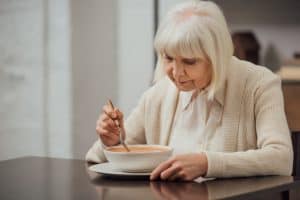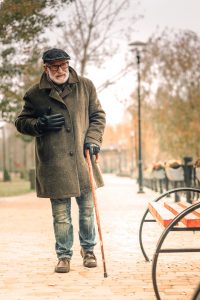
Staying safe at home during the pandemic means paying extra attention to your physical and mental health.
Since the coronavirus pandemic reached American shores in early 2020, daily life has changed for everyone. However, older adults and other vulnerable populations have been acutely impacted, leaving most of them to decrease social circles and opt for staying home more often in order to stay safe. Because older adults often have complex underlying medical conditions, they are at an increased risk to develop dangerous complications from COVID-19, leaving most older adults to adapt to more time spent at home.
While staying at home and avoiding crowded gatherings is the recommendation for seniors to stay safe, there are consequences of becoming isolated at home as well. Fortunately, older adults can stay physically and mentally healthy during the pandemic by adapting and adjusting some habits at home.
Nutrition

Add immune-boosting ingredients to your favorite recipe to keep your body as healthy as possible.
We’ve all heard the saying “you are what you eat”, meaning eating healthy can help you stay healthy. Seniors who are spending more and more time at home during the pandemic can focus on nutrition, which can lead to increased energy, a boosted immune system, and help them to prevent adding extra pounds during this somewhat sedentary time.
Here are a few tips for seniors who are looking to enhance their nutrition during the pandemic:
- Don’t worry about decreasing a recipe to serve only one. Go ahead and make a large batch and freeze the leftovers in single portions to pull out when you need a healthy lunch.
- Incorporate immune-boosting foods like bone broth, spinach, garlic, and citrus fruits into your diet
- Use meal delivery services like Meals on Wheels or sign up for grocery delivery with your local store
- Drink plenty of water to avoid any issues that come with dehydration, such as urinary tract infections.
- Skip extra cups of coffee or alcoholic beverages
Walking
Getting out of the house doesn’t have to be risky behavior. Taking a stroll around your favorite park or in your neighborhood is an excellent way to get fresh air and bust any cabin fever safely. When you are out walking, follow these best practices:
- Wear a mask when you cannot observe safe social distancing
- Avoid crowded areas or peak times when possible
- Make sure your tennis shoes are sturdy and have good traction
- Use an AppleWatch or other step tracker to keep yourself motivated each walk
- If the weather isn’t great, you can still meet your fitness goals by walking around your home. Just be sure you wear sturdy shoes and your pathways are clear of clutter.
More Fitness Options

A quick stroll outdoors in areas that aren’t crowded is a safe way to get fresh air and exercise
Walking doesn’t have to be your only safe physical activity during the pandemic. In fact, you can get moving safely in a variety of ways indoors and outside. Just remember to speak with your physician before beginning any fitness routine,
Here are a few options that can inspire you to get your body moving:
- Yoga or tai chi: Try chair yoga via YouTube or invest in a tai chi DVD
- Silver Sneakers has a full online library of senior-friendly workouts: You might even be able to get a subscription with Medicare
- Find chair exercises you can do from a sturdy chair in your home: Try this YouTube library
- Movement doesn’t have to be structured to be beneficial: Walk a few laps around your home each time you get up, dance to your favorite tunes, or garden in your backyard
Creative Arts
Now is the perfect time to brush up on a favorite hobby or pick up a new one. Getting creative can be an excellent outlet for your extra time at home and can decrease feelings of depression, anxiety, or stress. Don’t worry, you don’t need to be an accomplished artist or spend a lot of money on supplies.
Here are a few activities and hobbies that you might want to try while you are at home:
- Start a gratitude journal, listing five things you are thankful for every day
- Write short stories or jot down your favorite memories
- Try crocheting, cross-stitch, or knitting
- Paint kindness rocks to put out during your next walk around the neighborhood
- Contact your local art studio to see if they have any projects-to-go that include instructions and supplies for a designated project
- Write letters to friends and family
- Use stamps and other accessories to make homemade cards
- Start your own blog
- Take photos and try your hand at nature photography
- Try directed drawing courses online
Stress and Sleep
No matter how healthy you feel, the stress of the pandemic can quickly turn into depression or anxiety. You may even notice that you are having trouble falling and staying asleep, or that you are sleeping too much as a way to cope with your stress.
Here are a few tips for beating the stress and making the most of your sleep routine:
- Use an app like Headspace to start a daily meditation habit
- Try a consistent morning or evening routine that includes a lit candle, time for silent reflection, and a bit of gratitude
- Turn off the news and observe nature instead
- Set a timer on your social media usage if you find yourself mindlessly scrolling throughout the day
- Diffuse calming scents throughout your home, such as lavender or chamomile
- Stop drinking caffeine after 12 pm
- Make an appointment for a virtual meeting with your counselor or mental health professional
- Call your friends and family daily to talk about life and your frustrations
- Update your physician about any sleep disruptions or issues sooner rather than later
- Use calming music as the backdrop to your afternoon or evening activities
Cleaning and Safety Best Practices
Part of staying physically healthy while at home includes following best practices for infection control, including cleaning and disinfecting. You can minimize your risk by following these recommendations:
- Wash your hands frequently, including before/after preparing food, before leaving the home and after returning, after using the restroom, and after coughing, sneezing, or blowing your nose
- Wash your hands using soap and water when possible. Scrub for at least 20 seconds, which is roughly the same amount of time as singing the Happy Birthday song twice through
- Use hand sanitizer when you don’t have access to soap and water. Be sure the alcohol content is at least 60%
- Wear a mask when you cannot socially distance
- Wipe down frequently touched surfaces with diluted bleach solutions throughout the day, especially if you have had visitors
- Clean frequently touched surfaces include light switches, TV remotes, cell phones, countertops, kitchen cabinet handles, and doorknobs
Safety Tips for Seniors
Older adults who are at home more often due to the COVID-19 pandemic are at an increased risk for isolation, falls, and other health complications. Many seniors who are accustomed to having extra support from in-home caregivers or family members may now be facing daily or weekly tasks alone, which can lead to serious safety concerns.
If you have an aging loved one at home who is alone more than usual due to the coronavirus pandemic, here are a few considerations to keep in mind:
- Update all emergency information in the senior’s home and in their medical files so there is no delay in a crisis situation
- Update emergency information in your loved one’s cell phone
- Ensure your loved one keeps up with medication management safety by choosing to invest in a system that includes a notification to caregivers when a dose is missed
- Invest in medical alert systems with fall detection that will give your loved one direct contact with trained providers if they fall or have any other emergency at home. Look for pendants or other wearable technology that offers fall detection, such as Medical Guardian fall detection, or invest in smart technology for the home that can offer emergency and fall detection services.
More Resources and Links
No matter how you choose to stay physically and mentally active during the pandemic, you might find that you need some extra inspiration. Here are a few links that can point you in a healthy direction.
- Try this handout about staying active during the pandemic
- This article offers tips about how exercise and relaxation go hand-in-hand
- Start a safe walking program with these tips
- This information from the CDC provides tips for cleaning and disinfecting your home
- Here is the CDC guidance for visiting parks and recreational areas outside your home
The COVID-19 pandemic might have many seniors spending more time than usual at home, but with a few new tactics, older adults can remain physically and mentally healthy. If your older loved one is at home more often nowadays, remember to focus on safety first. Making sure they receive the assistance they need when they need it can go a long way in preventing emergency room visits due to falls or medication mismanagement.


